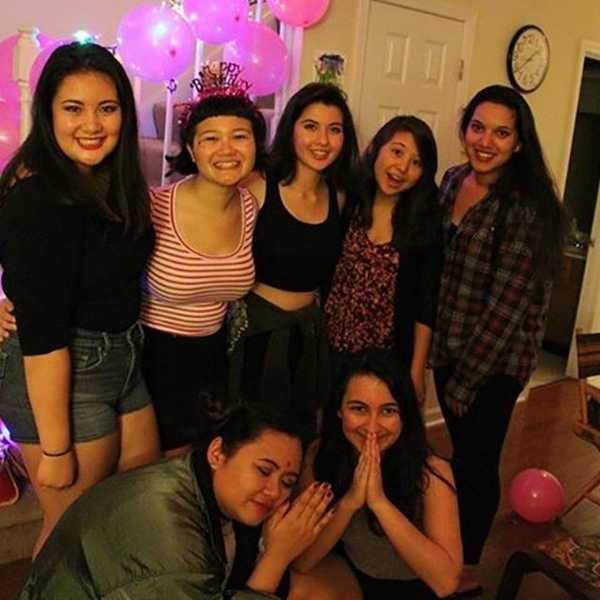Coming from an extensive traveling background and growing up in a U.S Military family, I've had the opportunity to meet diverse pools of people. But there has yet to be a place where I haven't been asked, "But aren't you Chinese?" To which I always reply, "Oh, I'm actually Korean." To which they never fail to say, "Oh, you guys all look the same." I've even been told that I'm "actually really pretty… for an Asian," as if it was a compliment.
Growing up Asian-American, you often forget that these remarks are racist, stereotypical, and offensive. You become used to it, to the point that it feels like you're immune. I get asked, "So where are you really from? 'Cause it's obviously not America" more times than anyone would think despite the fact that I was born and raised here. You grow up with people, who aren't just your friends, but your very own teachers, your colleagues and the strangers around you, who make such ignorant comments towards you, your family, and your culture.
"You're only smart because you're Asian," my classmates would tell me, "Of course, you've got good grades." Of course, to them, the color of my skin could only mean that my achievements were worth little in comparison to that of my white friends. It didn't help that I've always wanted to be a doctor, following a heavy Asian stereotype. Hence the question I always get asked, "Is that because you're overbearing Asian parents are forcing you?" And to that, I think, but do not say, "How much American stereotypical media and societal influence have you watched and heard to make you firmly believe and openly ask such questions without even second-guessing your pride and knowledge?"
As an Asian-American, I've grown up hearing "ching-chang-chong" and have had people pull their eyes back as they tease, "How can you even see like this?" It's true that at some point I stopped fighting back and telling these insulters that their remarks and actions are completely foolish and ignorant. At some point, I even started laughing with them, only fueling their bullying minds; only by doing this did their words no longer seem racially-demeaning and did I stop feeling targeted. I convinced myself that they didn’t seriously think these thoughts or were making fun of me, but that they were just trying to be funny. But what we often fail to see is that there are actually people out there convinced of these stereotypes and unwilling to learn and change their outlooks.
"I bet you have a tight p****," some friends in high school said to me, "you know… because you're Asian... Like how all Asians have small d****!" How do you even reply to such a vulgar comment? I can still picture that moment in which they roaringly laughed as they said that to my sixteen-year-old self. "These people -- who I thought were my closest friends --are surely just joking," I remember saying to myself as I faked a small laugh.
My teacher once braggingly held up his new iPhone to the class and laughed as he said, "I have a better phone than even all the Asians in this class," and then said in a terrible Asian accent, "You are dishonoring your ancestors;" the latter being a phrase he often said as criticism. "Playing the violin is in your Asian blood," I was told, "so don't mess this up."
Perhaps to the people who make these kinds of comments, ignorance really is bliss. Maybe they can't find anything funnier than to make fun of the appearance, the language, and the values of other races. I even get that sometimes it's an easy comedy outlet, something we see often in shows and performances. "Let loose," or "take a joke," they would say as a way to make them feel like their comments weren't actually as bad as they were. And sure, I'm one who doesn't get easily offended at many of the racial jokes made. Often, I do find them funny. However, there is a distinct line between humor and racism, and there are times where it does get crossed.
Racism is still considered such a practical joke. We laugh or feel uncomfortable when racist remarks are made. We have returned to increasing waves of national movements and organizations fighting for basic civil rights for their culture, religion, gender, and interests. We (including myself) even doubt or laugh at some of the current movements because we actually doubt that their cause is real and that there are people actually being deprived of something we think is so primitively basic. We judge an entire culture, religion, or gender based off of the things we choose to hear and see. And we forget that there are so many different people beyond the borders of our own comfort zones.
We choose to no longer be offended by racist remarks and we choose to stop taking action. We even choose to let the people we encounter to easily and uninterruptedly live in their stubborn and self-absorbed worlds of carelessness and ignorance.
But we do not choose the color of our skin. We do not choose how we look or sound. I did not choose to be Asian-American, but I do choose to have a voice as one. Sure, we can take jokes, be sexually targeted and insulted for the color of our skin. I mean, people of color have been taking it for hundreds of years, right? But next time, remember that the words you say and the things you do don't just reflect what kind of person you are, but that your words and actions have a much larger effect on the world than you think. And though I personally have not had the experience of the scarier, darker, and much more dangerous side of racism, there are people who have, are, and will experience something much worse than hearing "ching-chang-chong."





















